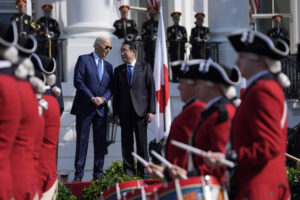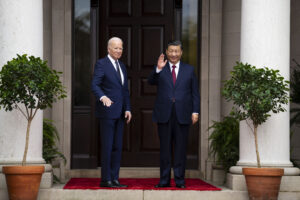In Response to…
In response to my University of California colleague Brad Delong, I would agree that things in China have gone far better than anyone predicted during the dark post-1989 days. But, what explains that success? Good vsionary planning? Strong leadership? A national psyche exhausted by any kind of turmoil? Good luck? The danger is that even the best economy tends to be cyclical, and it is far from clear that China has the political legitimacy, deeply enough rooted political institutions, or shared set of values to help it survive a downturn. It must also be said that almost no China specialists […]In response to my University of California colleague Brad Delong, I would agree that things in China have gone far better than anyone predicted during the dark post-1989 days. But, what explains that success? Good vsionary planning? Strong leadership? A national psyche exhausted by any kind of turmoil? Good luck?
The danger is that even the best economy tends to be cyclical, and it is far from clear that China has the political legitimacy, deeply enough rooted political institutions, or shared set of values to help it survive a downturn.
It must also be said that almost no China specialists have ever been particularly prescient in their prognostications about that country’s future. The best we can do is a kind of double entry book-keeping of the plusses and minuses we can observe in what has been a very contradictory situation over the last century and a half.
As to Wintermute and whether Taiwan is worth fighting for… I personally do not believe that any functioning democracy is worth throwing over the side to keep some other sort of the peace – commercial or otherwise. We Americans forget that we spent a quarter of a century “supporting self-determination” and “building democracy” in Taiwan.
As to Stuart Kingsley’s comments wondering about the ruling Communist Party’s ability to survive… I would not be quite so ready to write it off. Party leaders have ellicited an impressive flexibility and adaptability in the last few decades, even to the point of essentially abandoning Mao’s revolution in all but name. Remember, no one thought the Party would survive in the early 90s as the USSR and Eastern Europe imploded.
Even when it comes to controlling the Internet, one has to take one’s hat off to the Party. They have done an impressive job “using” it for business and state communications, while keeping it neutered politically. This may not be a level of control that will be easy to maintain, but we are witnessing one the great petri dish experiments in China as to the Internet’s fundamental controllability by some entity that really wishes to do so.
Finally, in response to Henri Day’s note that China has made some impressive progress on the environmental front, particualrly in forestry, I would say this: They have some notable success projects, but over-all the environment, forestry included, is under a savage assault. There are simply too many people using too few resources. And, as their expectations about consumption arise – to wit auto-kultur – this problem will only grow.
Thus, no matter how many remedial actions have been taken, China is still losing ground environmentally. This is the finally inflexible edge of the envelope that the country confronts.
Your support matters…Independent journalism is under threat and overshadowed by heavily funded mainstream media.
You can help level the playing field. Become a member.
Your tax-deductible contribution keeps us digging beneath the headlines to give you thought-provoking, investigative reporting and analysis that unearths what's really happening- without compromise.
Give today to support our courageous, independent journalists.






You need to be a supporter to comment.
There are currently no responses to this article.
Be the first to respond.